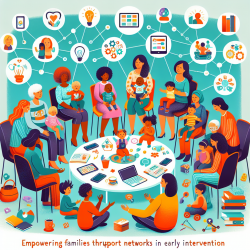Introduction
In the realm of speech-language pathology and online therapy services, making data-driven decisions is crucial for enhancing outcomes for children and communities. The study titled The Efficacy of a Health Promotion Intervention for Indigenous Women: Reclaiming Our Spirits presents a compelling case for tailoring interventions to meet the unique needs of Indigenous women experiencing intimate partner violence (IPV). This blog aims to provide practitioners with insights into how these findings can be applied to improve their practice and encourage further research.
Understanding the Context
Indigenous women globally, including those in Canada, face disproportionately high rates of IPV. The research highlights the inadequacy of conventional services in addressing the needs of these women, emphasizing the importance of culturally tailored interventions. The Reclaiming Our Spirits (ROS) intervention was developed as a culturally sensitive approach to improve the quality of life and health outcomes for Indigenous women.
Key Findings
The study involved 152 Indigenous women living in marginalizing conditions across two Canadian cities. The intervention, delivered over 6 to 8 months, focused on six areas of health promotion, integrating cultural teachings and guidance from Indigenous Elders. The results were promising:
- Significant improvements in quality of life and trauma symptoms from pre- to post-intervention, sustained six months later.
- Positive changes in depressive symptoms, social support, and mastery.
- No significant change in chronic pain disability, highlighting the need for targeted pain management strategies.
Implications for Practitioners
For practitioners, the study underscores the importance of culturally informed and community-based interventions. Here are some actionable insights:
- Integrate Cultural Competency: Develop interventions that respect and incorporate Indigenous cultural practices and teachings.
- Collaborate with Indigenous Elders: Leverage the knowledge and leadership of Elders to enhance trust and engagement among participants.
- Focus on Holistic Health: Address not only the immediate health concerns but also the broader socio-economic and cultural factors affecting Indigenous women.
Encouraging Further Research
While the ROS intervention shows promise, there is a need for further research to explore its applicability in different contexts and among other marginalized groups. Practitioners are encouraged to engage in research that continues to refine and test culturally tailored interventions.
Conclusion
Incorporating the findings from the Reclaiming Our Spirits study into practice can significantly enhance the effectiveness of interventions for Indigenous women experiencing IPV. By prioritizing cultural competence and community engagement, practitioners can contribute to better health outcomes and empowerment for these communities.
To read the original research paper, please follow this link: The Efficacy of a Health Promotion Intervention for Indigenous Women: Reclaiming Our Spirits.










